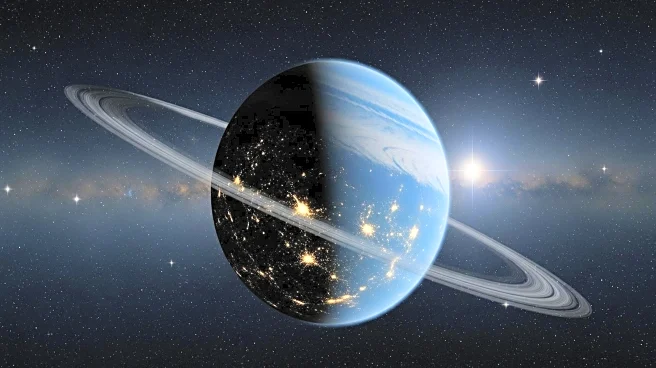What is the story about?
What's Happening?
Recent research led by Caroline Dorn from ETH Zürich suggests that sub-Neptune planets, previously thought to be 'water worlds,' may not possess the vast oceans scientists once believed. These planets, larger than Earth but smaller than Neptune, were hypothesized to form far from their stars, accumulating ice that would melt into oceans as they migrated inward. However, the study indicates that chemical interactions between magma and the atmosphere sequester water deep within the planet's interior, leaving only modest traces of water on the surface. This challenges previous assumptions about Hycean planets, which were thought to have massive layers of water. The findings come after claims about K2-18b, an exoplanet 124 light-years away, suggested it might be an ocean world capable of supporting life.
Why It's Important?
The study's findings have significant implications for astrobiology, as they suggest that the most promising environments for liquid water and potential life may be smaller, rocky planets similar to Earth, rather than the previously hypothesized Hycean planets. This shifts the focus of exoplanet research and exploration, potentially altering the search for extraterrestrial life. The notion that Earth may not be as unique as previously thought could influence future studies on planetary formation and the conditions necessary for life. The research also highlights the importance of understanding chemical interactions in planetary atmospheres, which could redefine criteria for habitable worlds.
What's Next?
Further research is needed to explore the chemical processes that limit water presence on sub-Neptune planets. Scientists may focus on smaller, rocky exoplanets as potential candidates for hosting life. The study encourages a reevaluation of the criteria used to identify habitable planets, potentially influencing future missions and observations by telescopes like the James Webb Space Telescope. Continued investigation into the atmospheric and geological characteristics of exoplanets will be crucial in refining our understanding of planetary habitability.
Beyond the Headlines
The study raises ethical and philosophical questions about humanity's place in the universe. If Earth is not as exceptional as once thought, it challenges long-held beliefs about our planet's uniqueness and the potential for life elsewhere. This could influence cultural and scientific perspectives on space exploration and the search for extraterrestrial life.
















